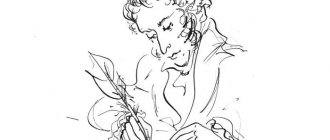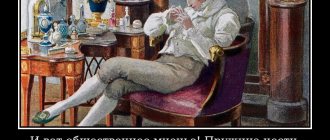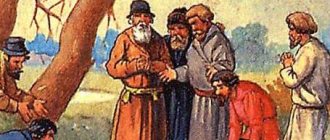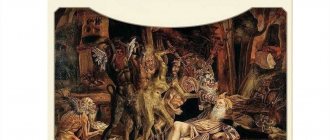Quotes from Nikolai Alekseevich Nekrasov
Scouring little thieves for the pleasure of big ones
From "The Poet and the Citizen" (1855 - June 1856).
There have been worse times, but nothing meaner
From “Contemporaries” (part 1 “Anniversaries and Triumphants”, 1875).
talking machine
From "Contemporaries" (1875).
The people's share, their happiness, light and freedom, first of all!
From “Who Lives Well in Rus'” (1877).
There are women in Russian villages
From "Red Nose Frost" (1863).
It’s just a pity - neither I nor you will have to live in this wonderful time.
From "The Railway" (1864).
I know that instead of the chains of serfs, people came up with many other
From "Freedom" (1861).
Play, children! Grow in freedom! That's why you were given a wonderful childhood
From "Peasant Children" (1861).
Goes and hums Green noise, Green Noise, spring noise
From "The Green Noise" (1863).
The keys to female happiness, to our free will, have been abandoned, lost to God himself!
From “Who Lives Well in Rus'” (1877).
He will stop a galloping horse and enter a burning hut!
From "Red Nose Frost" (1863).
Love as long as you love, endure as long as you endure, forgive as long as you forgive, and - God will be your judge!
From "The Green Noise" (1863).
There are many noble words, but no noble deeds are visible...
From "Smug Talkers" (1856).
Three paths for men: Tavern, prison and hard labor
From “Who Lives Well in Rus'” (1877).
Muse of revenge and sadness
From “Shut Up, Muse of Revenge and Sorrow!” (1855).
We hear the sounds of approval not in the sweet murmur of praise, but in wild cries of anger
From “Blessed is the gentle poet” (1852).
All over you, Mother Rus', Like brands on a criminal, Like a brand on a horse, Two words are scrawled: “Takeaway and drinking”
From “Who Lives Well in Rus'” (1877).
Naive and passionate soul
From “In Memory of a Friend” (1853).
That nature is not mediocre, that land has not yet perished
From "The Schoolboy" (1845).
Don't trust the crowd - empty and deceitful, forget your doubts
From “When out of the darkness of error” (1846).
There is no measure for Russian hops. Have they measured our grief?
From “Who Lives Well in Rus'” (1877).
In Rus', you know, keeping silent and bowing is a ban on anyone!
From “Who Lives Well in Rus'” (1877).
Oh, the box is full, full, there are chintz and brocade. Have pity, my sweetheart, on the brave shoulder!
From “The Peddlers” (1861).
You may not be a poet, but you must be a citizen
From "The Poet and the Citizen" (1856).
If we drink, it means we feel strong!
From “Who Lives Well in Rus'” (1877).
Russia is not foreign, we have delicate feelings, we are instilled with pride!
From “Who Lives Well in Rus'” (1877).
From work, no matter how much you suffer, you will not be rich, but you will be hunchbacked!
From “Who Lives Well in Rus'” (1877).
Sow reasonable, good, eternal
From "To the Sowers" (1877).
It is glorious to live in holy Rus' for the people!
From “Who Lives Well in Rus'” (1877).
Words should be cramped, but thoughts should be spacious
From “Form.” Imitation of Schiller" (1879).
They curse him on all sides, and only when they see his corpse how much he has done will they understand how he loved while hating!
From “Blessed is the gentle poet” (1852).
In the midst of the world below, there are two paths for a free heart
From “Who Lives Well in Rus'” (1877).
We are destined to have good impulses, but we are not given anything to accomplish.
From "A Knight for an Hour" (1862).
You are poor, you are abundant, you are powerful, you are powerless, Mother Rus'!
From “Who Lives Well in Rus'” (1877).
King hunger
From "The Railway" (1864).
New in blogs
https://youtu.be/p3H08D-jcr8
— Frost Red Nose (2)
- Russian women
And phorisms, quotes, statements, phrases - Nikolai Alekseevich Nekrasov
- Vulgar experience is the mind of fools.
- Sow what is reasonable, good, and eternal. Sow, the Russian people will thank you from the heart.
- The will and labor of man create marvelous wonders.
- There have been worse times, but none meaner.
- The blow is fatal to that hand that caressed us.
- Where there are roses, there are thorns - such is the law of fate.
- A crowd without red girls is like rye without cornflowers.
- Where, if not in a storm, can Slavic nature turn around?
- Blessed is the chattering poet and pitiful the silent citizen.
- That heart will not learn to love that is tired of hating.
- You may not be a poet, but you must be a citizen.
- Bless the work of the people and learn to respect the peasant.
- Do not go to the camp of the harmless, When you can be useful.
- Nothing is given for free: fate asks for redemptive sacrifices.
- There is a king in the world - this king is merciless, hunger is his name.
- Jealousy is as gullible as a child and as rabid as a wild animal.
- The power of the people is mighty, the conscience is calm, the truth is tenacious.
- Literature serves as a representative of the mental life of the people.
- In the soul of every person there is a valve that opens only with poetry.
- The struggle of the soul with the body is difficult, the struggle of a person with himself is difficult.
- Follow the rule stubbornly: keep your words cramped and your thoughts spacious.
- Let not every warrior harm the enemy, but everyone goes into battle. And fate will decide the battle.
- To arouse the attention of the powerful of the world to the people - what could the lyre serve more worthily?
- Fate was preparing a glorious path for him, a great name - a people's intercessor, consumption and Siberia.
- People of the servile rank are sometimes real dogs: the heavier the punishment, the dearer the Lord is to them.
- Our own misfortunes always seem to us exceptional, beyond comparison.
- Literature should not bend to the level of society in its dark or dubious phenomena.
- Whoever was so able to forgive for a long time, not to understand, not to see, he probably loved deeply, but he will hate deeper.
- In whom the sense of duty has not cooled, who is incorruptibly straight in heart, in whom talent, strength, accuracy, should not sleep now.
- Literature should not deviate one step from its goal - to elevate society to its ideal - the ideal of goodness, light and truth.
Let changing fashion tell us that the old theme is “the suffering of the people.” And that poetry should forget it. Don't believe it, young men, she doesn't age.
N.A. Nekrasov. Aphorisms. Quotes
Birch Rus' - Evgeniy Obukhov-Petrik
Subscription settings
11:56
N.A. Nekrasov was born on December 10, 1821. APHORISMS. QUOTES. There have been worse times, but none meaner. People of the servile rank are sometimes real dogs: the heavier the punishment, the dearer the Lord is to them. The living cares for the living, and the dead sleep in deep sleep... Nothing is given for free: fate asks for redemptive sacrifices. That heart will not learn to love that is tired of hating. Let not every warrior harm the enemy, but everyone goes into battle. And fate will decide the battle. You may not be a poet, but you must be a citizen. Blessed is the chattering poet and pitiful the silent citizen. The blow is fatal to that hand that caressed us. In whom the sense of duty has not cooled, who is incorruptibly straight in heart, in whom talent, strength, accuracy, should not sleep now. There are times, there are whole centuries, in which there is nothing more desirable, more beautiful - a crown of thorns... Where, if not in a storm, can Slavic nature unfold? Literature should not bend to the level of society in its dark or dubious phenomena. Alas! writing for the public, for the world, is not the destiny of a Russian poet... A son cannot look calmly on the grief of his dear mother, A citizen worthy of the Fatherland will not be cold in soul... Go into the fire for the honor of the Fatherland, For convictions, for love... Go and die blamelessly. It’s not for nothing that you die: the matter is strong, When blood flows underneath it. Let changing fashion tell us that the old theme is “the suffering of the people.” And that poetry should forget her. Don't believe it, young men, she doesn't age. There is a king in the world - this king is merciless, hunger is his name. Literature should not deviate one step from its goal - to elevate society to its ideal - the ideal of goodness, light and truth. Sow the reasonable, the good, the eternal, Sow! The Russian people will say a heartfelt thank you to you... Be afraid of sharing their fate, Rich in word, poor in deed, And do not go to the camp of the harmless, When you can be useful! Don't sympathize with people's grief, don't read humane books. But don’t put nails behind the carriage, so that the child jumps up and pricks himself! The government executes an open villain, Satire acts more widely and boldly, like a bullet, being able to find the culprit. Follow the rule stubbornly: keep your words cramped and your thoughts spacious. He who is sick himself cheerfully and greedily listens to the news about the sick... Who, serving the great goals of the century, gives his life entirely to the fight for a man's brother. Only he will survive himself. No matter how warm the alien sea is, No matter how red the alien distance, It is not for her to correct our grief, to unlock Russian sadness! We cannot be defeated by beauty, we cannot be surprised by debauchery. Know: strength does not lie in wealth, whether rank is great or small, but in equality and brotherhood! I swear I honestly hated it! I swear, I truly loved! Our wonderful capital is rich to the brim. Life in it is difficult for the poor, but for millionaires it is paradise. Here there are pleasures everywhere for the heart and eyes. Here everything, without exception, is possible for people. With money you can grow twice as big, get damn fat, die from hunger and damp without money.
About the product
The poem by N. A. Nekrasov “Who Lives Well in Rus'” raises many problems of the Russian peasantry. It would seem that after the abolition of serfdom, life should change, but in reality everything is completely different.
The first problem that the author touches on is drunkenness. A man earns his bread through hard work, but spends all his money in a tavern, forgetting his family. From what? The answer is given by Yakim Nagoy: the man does not feel any profit from his labor, everything received goes to the three “shareholders” - the king, the lord and God. Overwork kills the desire for better things more than wine. Anger accumulates in the peasants, dejected by such a life, they decided to revolt, but alcohol extinguishes the bloody storm in their souls. This, perhaps, is one of the reasons why the lower strata of society rarely get out into the public eye - cheap booze takes them away from real problems. A man drinks more than he could handle if not for alcohol.
It is also worth noting the image of Matryona Timofeevna, one of the “lucky ones”. She had a hard time: forced marriage, someone else's side, death of her firstborn and parents, hunger, reproaches, sending her husband to the recruits. However, a strong woman overcame all this thanks to her character. She achieved a relatively normal life when she did not give in to circumstances: pregnant, in the cold, in the dark, she went to her master to beg him to return her husband - she could not manage the entire household alone. And one of the reasons why she was able to improve her life and maintain her beauty at the age of forty was the non-drinking family in which she grew up “like Christ in his bosom.” However, looking for happy people who have not known grief among women is a bad idea. This reflects the second problem of the work - Russian women have never known happiness, the keys to it have been lost.
The third thing Nekrasov draws attention to is the slave psychology of the freed peasantry, which is just learning to be citizens. The chapter about the Last One and the story about poor Yakov show what happens when a person is in slavery all his life and knows no other life. Mr. Utyatin does not believe that he, the master chosen by God himself, is being deprived of his serfs. He doesn’t even allow the thought that people like peasants can live without his control. And these people agree to play along, be serfs, stroke the lord’s pride and thank them for their patronage.
The second image of a slave is the slave Yakov, who served his master all his life. When the master’s legs were paralyzed, Yakov fussed with him, fed him, gave him water, drove him, and was his “favorite.” He could not leave even after the master did not give permission for Yakov’s nephew to marry a local girl. After some thought, Yakov hanged himself in front of his master. This was a kind of sign of protest against slavery, which he could not resist.
However, among these characters there are also those who can become a support for Rus'. Examples are Yermil Girin, who earned the trust of the people with his honesty, and Grisha Dobrosklonov, a young revolutionary with progressive views who must change Russia for the better. Let the peasantry’s path to freedom be long, but the very fact that the men thought about the “lucky one” is proof of the development of their self-awareness.
Dostoevsky about Nekrasov: Not higher, but not lower than Pushkin
Nikolay Nekrasov. 1860s
“I was alone in a huge city filled with half a million people who absolutely had no need for me.” This is what the hero of his unfinished autobiographical novel says about himself.
“I promised myself I wouldn’t die in the attic.” The author himself says this.
He went to St. Petersburg on a cart, without graduating from the Yaroslavl gymnasium, having with him a notebook of poems and one hundred and fifty rubles in banknotes, leaving in a village near Yaroslavl, where he lived for seventeen less than seventeen years, a tender, beloved mother, whom he would never see again. He went to study at the university against the will of his stern father, who wanted his son to join the Noble Regiment. He was not accepted into the university; he soon spent the money. For pennies or for a piece of bread, he wrote letters and petitions to the illiterate, gave lessons, composed advertisements and posters, composed parodies, feuilletons, vaudevilles and still did not eat every day, walked in the winter cold in holey boots and a straw hat, caught a cold and coughing, lived either in someone’s closet, or in a wooden outbuilding, the owners of which were awaiting the death of a sick guest from day to day.
“I bought Karabikha... I paid dearly, but I don’t regret it, because I’m buying not for income, but for my own living in the summer.” Paid thirty-eight and a half thousand rubles in silver. A two-story house with a belvedere, a veranda and two outbuildings, an English park with branchy trees and green lawns, an orchard, a forest, hills, meadows, and below the clean river Kotorosl, flowing into the Volga, a river that he had conquered since childhood.
Between that tattered, trembling, always hungry young man and this wealthy gentleman there is a distance of just over twenty years.
Nothing fell from the sky. And there was no one or anything to count on: no financial support from relatives, no inherited estate, like, say, Turgenev, Goncharov or Tolstoy. “He had to get out of the rubbish and dirt himself,” he said. More than twenty years of work and perseverance. Of course, it was talent that drove me. But there is talent without will. And then either it dies early or is not implemented.
Nekrasov came true. As a great poet and as an outstanding magazine editor.
Wealthy does not mean prosperous, knowing neither suffering nor compassion. Personal and civic temperament led him through life. Despite the fact that fate and character were filled with painful, dramatic contradictions.
“...He lay in his office for two days in a terrible melancholy, repeating in nervous irritation that he was disgusted with everything in life, and most importantly, he was disgusted with himself.” This is how the beautiful Avdotya Panaeva, who loved and tormented him, a literary gifted woman, formally someone else’s wife, remembered him. They lived unmarried and separated sixteen years later.
Nekrasov treated painful attacks of jealousy and melancholy, ruined health, and thirst for loneliness with foreign resorts, Russian countryside nature, hunting and cards. But most of all, poetry, when he could immerse himself in it, as well as active participation in literary life, helping writers, which sometimes included large gambling winnings.
The famous magazines “Sovremennik” and “Otechestvennye zapiski” owe their glory in the 60s of the 19th century to his editorial hand, his high taste and courageous defense of the ideals of love of freedom. It was to him that Turgenev, Goncharov, Herzen, Ostrovsky gave their best works. It was he who discovered Dostoevsky and Tolstoy, publishing their first works. He wrote to young Tolstoy: “You have already done a lot... and you will do even more when you understand that in our fatherland the role of a writer is, first of all, the role of a teacher and, if possible, an intercessor for the voiceless and humiliated.” At that time, Gogol’s “natural school” was established - what Nekrasov wrote down for himself as a “turn to truth.” This became the main thing for him. Both in editing and in poetry. St. Petersburg beggars and Volga barge haulers, peasant children and peasant women, coachmen, shacklers, “state criminals” entered his poetry, becoming a discovery. Many people perceived this almost with disgust: wow, how is that possible! Many - with admiration: it turns out that it’s possible! Belinsky, having heard one of the poems, hugged Nekrasov and exclaimed almost with tears in his eyes: “Do you know that you are a poet and a true poet?” But Botkin, one of his close acquaintances, said something else: “Stop singing the love of coachmen, gardeners and all the hillbillies. This is a falsehood that hurts the ear”...
In the poem dictated before his death, Nekrasov casts his last glance at his “pale, bloody, whip-scarred Muse.”
He died in the arms of his beloved sister Anna and his beloved girl-wife Fekla-Zinaida, whom he met when he was 49 and she was 19. He did not like the name Fekla, he began to call her Zina. She was one of the “simple” ones. However, his friends soon accepted her into their circle. They rode horses together, hunted together, went to the theater, went on water trips abroad, he became calmer and brighter. And the cancer was already finishing its work.
Nekrasov married Fekla-Zinaida at home, in a white shirt, barefoot, he was led three times around the lectern, supported by his hands, he was very weak, and any touch caused him pain.
Over time, ideas and preferences change in society. To some, even today, the poet’s muse seems down-to-earth, prosaic, and the feelings with which he defended the offended, the poor and the insulted seem outdated and almost primitive.
Open his volume and re-read it. Dozens of wonderful poems, the music of which continues to sound, the poems “Who Lives Well in Rus',” “Sasha,” “Russian Women” remained an expression of his special, realistic, unique gift. His soul, sincere and suffering, will certainly meet souls who will respond to him with love.
As Dostoevsky answered, who said over the grave that Nekrasov is a poet, in his talent no lower than Pushkin. "Higher!" - there was a cry. The young people from the crowd of five thousand who followed the coffin shouted. “Not higher, but not lower than Pushkin,” Dostoevsky repeated.
Nikolai Alekseevich Nekrasov - born November 28, 1821, Nemirov, Vinnitsa district, Podolsk province, Russian Empire. Russian poet, writer, publicist. Died: December 27, 1877, St. Petersburg, Russian Empire.Aphorisms, quotes, sayings, phrases - Nekrasov Nikolay Alekseevich
- Vulgar experience is the mind of fools.
- Sow what is reasonable, good, and eternal.
- The will and labor of man create marvelous wonders.
- There have been worse times, but none meaner.
- The blow is fatal to that hand that caressed us.
- Where there are roses, there are thorns - such is the law of fate.
- A crowd without red girls is like rye without cornflowers.
- Where, if not in a storm, can Slavic nature turn around?
- Blessed is the chattering poet and pitiful the silent citizen.
- That heart will not learn to love that is tired of hating.
- You may not be a poet, but you must be a citizen.
- Bless the work of the people and learn to respect the peasant.
- Do not go to the camp of the harmless, When you can be useful.
- Nothing is given for free: fate asks for redemptive sacrifices.
- There is a king in the world - this king is merciless, hunger is his name.
- Jealousy is as gullible as a child and as rabid as a wild animal.
- The power of the people is mighty, the conscience is calm, the truth is tenacious.
- Literature serves as a representative of the mental life of the people.
- In the soul of every person there is a valve that opens only with poetry.
- The struggle of the soul with the body is difficult, the struggle of a person with himself is difficult.
- Follow the rule stubbornly: keep your words cramped and your thoughts spacious.
- Let not every warrior harm the enemy, but everyone goes into battle. And fate will decide the battle.
- To arouse the attention of the powerful of the world to the people - what could the lyre serve more worthily?
- Fate was preparing a glorious path for him, a great name - a people's intercessor, consumption and Siberia.
- People of the servile rank are sometimes real dogs: the heavier the punishment, the dearer the Lord is to them.
- Our own misfortunes always seem to us exceptional, beyond comparison.
- Literature should not bend to the level of society in its dark or dubious phenomena.
- Whoever was so able to forgive for a long time, not to understand, not to see, he probably loved deeply, but he will hate deeper.
- In whom the sense of duty has not cooled, who is incorruptibly straight in heart, in whom talent, strength, accuracy, should not sleep now.
- Literature should not deviate one step from its goal - to elevate society to its ideal - the ideal of goodness, light and truth.
- Let changing fashion tell us that the old theme is “the suffering of the people.” And that poetry should forget her. Don't believe it, young men, she doesn't age.
Quotes from the book “Who Lives Well in Rus'”
The poem “Who Lives Well in Rus'” tells us the deep meaning of a problem that still exists today. Quotes from it are quite popular. It so happened that people in Russia are forced to work hard, survive, and constantly be in search of income. People have practically no time for themselves, family, and especially entertainment. Since ancient times, it has been the custom that men work, and then come home from work and drink.
But you can relax in another way. For example, through your favorite hobbies, time devoted to yourself. But how can a person indulge in a hobby when there is practically no time to sleep? From this, alcohol comes as a replacement for hobbies, since it is the simplest means to relax a person’s brain. It is unfortunate that people use alcohol as an alternative to a hobby, but each person decides his own destiny.
Don’t dress well, don’t wash your face white, your neighbors have sharp eyes and sharp tongues! Walk the streets more quietly, carry your head lower, if you are having fun, don’t laugh, don’t cry out of sadness!.. Nikolai Alekseevich Nekrasov.
My handsome man drove away all the anger from my soul with an angelic smile, Like the spring sun Drives away the snow from the fields...
Hey, man's happiness! / Leaky with patches, / Humpbacked with calluses...
Matryona Timofeevna A dignified woman, broad and dense, about thirty-eight years old. Beautiful; gray hair, large, stern eyes, rich eyelashes, stern and dark. She’s wearing a white shirt, a short sundress, and a sickle over her shoulder.
He works himself to death, drinks until he is half to death!...
In someone else's family - sleep is short!..
There is no measure for Russian hops. Have they measured our grief? Is there a limit to the work? Wine brings down the peasant, but grief doesn’t bring him down? Work isn't going well?
Statements About Nekrasov
Nikolai Alekseevich Nekrasov, (1821-1877) poet
Literature should not bend to the level of society in its dark or dubious phenomena. At any cost, under whatever circumstances, it must not retreat one step from its goal - to elevate society to its ideal - the ideal of goodness, light and truth.
Literature serves as a representative of the mental life of the people.
Our own misfortunes always seem to us exceptional, beyond comparison.
Just as persecution of poetry cannot kill poetry, in the same way no amount of favor towards poetry creates gifted poets.
True recognition of merit, honor and gratitude await every conscientious worker of thought. But grief and shame to those who sacrifice the truth to self-interest and pride.
Where there are roses, there are thorns - this is the law of fate.
Jealousy is as gullible as a child and as rabid as a wild animal.
Follow the rule persistently: keep your words cramped and your thoughts spacious.
Blessed is the chattering poet, And pitiful is the silent citizen!
Youth is not free to make mistakes: Without tears, grief is not clear to her, Without laughter, joy is not visible...
In striving for the ideal, however, there is no Bad.
The will and work of man creates marvelous wonders!
Where, if not in a storm, And the Slavic nature can turn around?
Where is the logic? Fathers are villains, Low-worshipers, lackeys, And seeing scoundrels in children, And they are indignant and amazed, As if from such fathers Heroes will be born somewhere?
Where there are roses, there are thorns - This is the law of fate.
Yes! But still the melody of Our songs is sad, one cannot help but admit. Having failed to remake it, we decided to stay with it.
If prose in love is inevitable, then let’s take a share of happiness from it: After a quarrel, the return of love and participation is so complete, so tender.
There are times, there are whole centuries, in which there is nothing more desirable, more beautiful than a crown of thorns...
The living cares for the living, And the dead sleep in deep sleep...
Know: strength does not lie in wealth, whether rank is great or small, but in equality and brotherhood!
And they were louder than us, But they didn’t do any good with their pen... We won’t reduce fools in Russia, But we’ll bring sadness to the smart ones.
Go into the fire for the honor of your homeland, For your convictions, for your love... Go and perish blamelessly. It’s not for nothing that you die: the matter is strong, When blood flows underneath it...
To arouse the attention of the mighty of the world to the people - What better service could the lyre serve?
No matter how expensive it is for the poor to live, it is twice as expensive for him to die.
No matter how warm the alien sea is, No matter how red the alien distance, It is not for her to correct our grief, to unlock Russian sadness! We cannot be defeated by beauty, we cannot be surprised by debauchery.
He who is sick himself cheerfully and greedily listens to news about the sick...
Who, serving the great goals of the century, gives his life entirely to the fight for man's brother. Only he will survive himself.
Only those who are hidden underground do not harbor hope in their hearts... And only those who have no hope again, in whom the blood has frozen forever.
We love our sister, and wife, and father, But in agony we remember our mother!
The son cannot look calmly at his dear mother’s grief, a citizen worthy of his homeland will not be cold in soul...
Don't sympathize with people's grief, don't read humane books. But don’t put nails behind the carriage, so that the child jumps up and pricks himself!
Silence before death Befits a Christian...
There is no holiday in life for those who do not work on weekdays.
It’s gratifying to see that sometimes the melancholy comes over even a fool, That sometimes it turns the features of a vulgar face into wrinkles...
The government executes an open villain, Satire acts more widely and boldly, like a bullet, being able to find the culprit.
Let not every warrior harm the enemy, but everyone goes into battle.
Sow the reasonable, the good, the eternal, Sow! The Russian people will say a heartfelt thank you to you...
Words... words... beautiful stories About exploits... but where are their deeds? Or are there no people who go beyond the phrase? Among our hypocritical deeds And all the vulgarity and prose I spied some holy, sincere tears in the world - Those are the tears of poor mothers! They will not forget their children...
Be afraid of sharing their fate, Rich in word, poor in deed, And do not go to the camp of the harmless, When you can be useful!
That heart will not learn to love, Which is tired of hating.
The blow is fatal to that hand that caressed us.
The happy man's enemies die, the unhappy man's friend dies.
Alas! writing for the public, for the world is not the destiny of the Russian poet...
Alas! while the peoples are languishing in poverty, submitting to the scourge. Like skinny herds across mown meadows, the Muse will mourn their fate and serve them, and there is no stronger, more beautiful union in the world.
I deeply despise myself for this, That I live - day after day, uselessly ruining.





